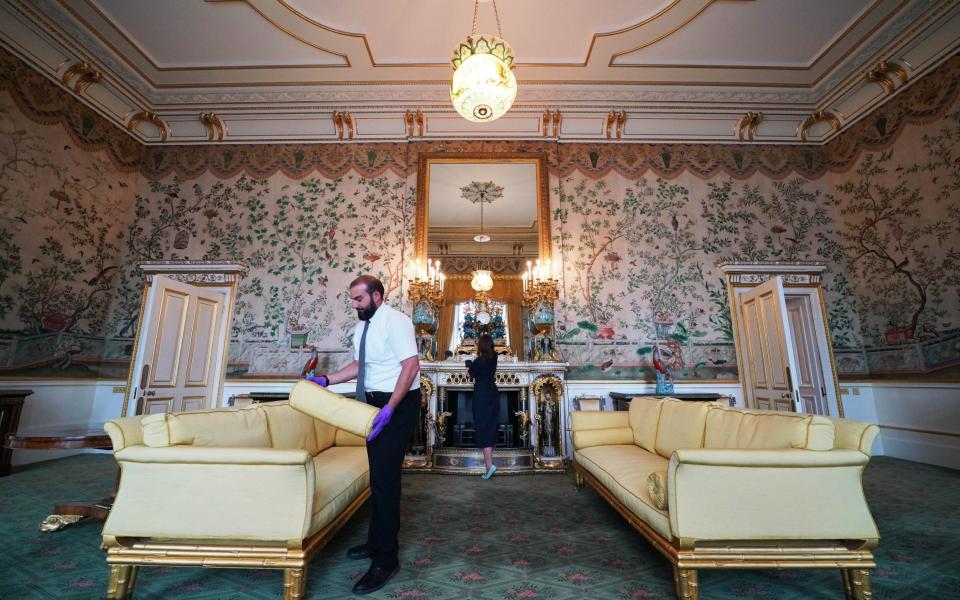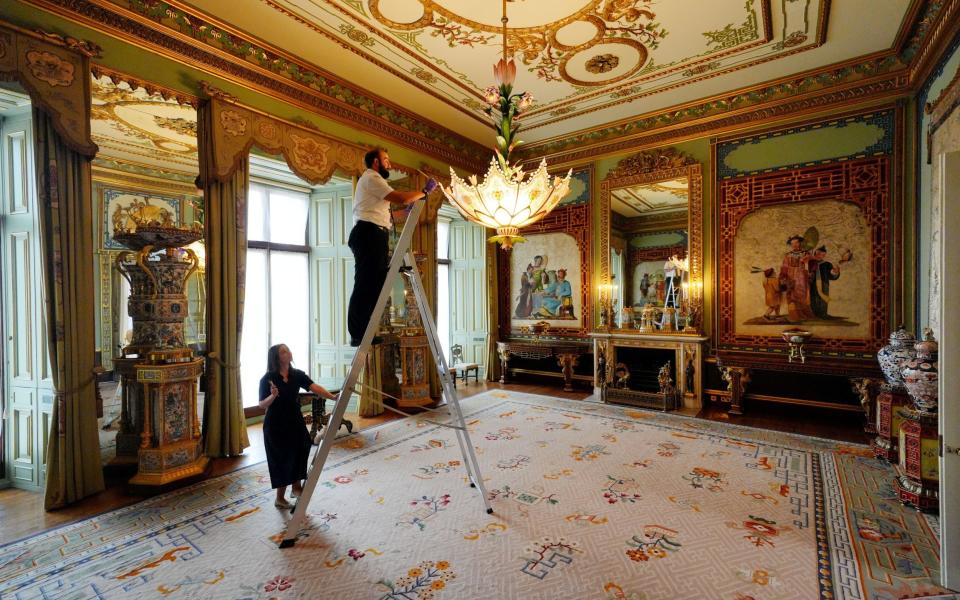King allows public to peek from royal balcony from next week – but one thing will be missing

When the public is invited in to see the view from the Buckingham Palace balcony for the first time next week, they will walk in the footsteps of the Royal family.
Perhaps unexpectedly, those footsteps will take them past hundreds of gold dragons from floor to ceiling, a Buddha statue that blows incense through its mouth and all the way up to arguably the most famous net curtains in the world.
Inside the Centre Room at the palace, opened up at the request of the King, a first cohort of visitors will be allowed to peer out at where crowds gather for jubilees, royal weddings and birthdays.
There is just one thing missing from a true royal outing: the television in the corner, watched by the King and his family on major national occasions so they can take in the full view down The Mall.
The television has been hidden away for the tour, but visitors will be able to see for themselves why it is needed: the Queen Victoria Memorial directly in front of the balcony blocks the view of crowds ahead.

Instead, tourists will – for the first time – see exactly what kings and queens have seen for generations, from the distinctive interior decorations of the East Wing to the Changing of the Guard below.
There are no ropes, no cordons and no glass protecting the centuries-old artefacts, most of which were collected and commissioned by George IV for Brighton Pavilion before being moved en masse to Buckingham Palace in 1850 after the new wing was built.
Some 6,000 visitors will walk through the East Wing this summer, in a trial opening of the private rooms of the palace which have been conserved and refurbished as part of a wider £369 million, 10-year project.
The King was the driving force behind the opening and was given his own tour to sign off on what visitors would see.

It begins in the Yellow Drawing Room, previously used as a meeting room for palace staff and where Elizabeth II recorded her Christmas address to the nation in 2004, moving through the 240ft-long “Principal Corridor” to the Centre Room.
Visitors will not be allowed to stand on the balcony, which is lower than it appears from afar and has wire cables and lighting on its floor.
Those who look closely as they walk will see dozens of hidden details which have never been visible before, even in rarely-released photographs of the rooms.
At knee height, there are table legs carved to look like Chinese men.
Under a large portrait by Thomas Gainsborough sits a Buddha figure, revealed to be an incense burner which blows smoke from its mouth.
If ticket-holders crouch down, they may spot the figure of a nodding statue of a man under one of the tables.
The style is known as “Chinoiserie”, commissioned to emulate the art and design of China and Japan at a time when it was little known in the West.

Most items were acquired by George IV for Brighton Pavillion, which was sold off in 1850 by Queen Victoria to finance the 1847-9 construction of the East Wing to accommodate her growing family.
The opulent decor was moved to London via 143 shipments on artillery carts, where it transformed the bare walls and corridors of the new wing to a colourful home where images of birds, flowers, butterflies and fish mix with large traditional royal portraits and chandeliers.
Just as Victoria and Albert’s children may have counted the hundreds of gold dragons perched on ceilings, fireplaces, vases and curtain poles, so the new generation of Prince George, Princess Charlotte and Prince Louis can do the same 175 years on.
Some of the rooms will be familiar to the public via photographs: this week, the West Indies cricket team was hosted in one of the reception rooms, and the late Queen posed for portraits in the Yellow Drawing Room due to its exceptional natural light.
Large decorative pagodas can be found in the corners, with thick curtain poles carved to look like palm trees overhead and flower patterned carpets below.
Where there were once candles, there are now electric versions which have been rewired in a project which has seen every floorboard taken up and 3,500 works of art removed for conservation.

Just a handful of changes have been made over the years, with Queen Mary putting in wallpaper and bringing silk hangings out of storage, but the “vast majority” is unchanged since Prince Albert oversaw original plans.
Yellow sofas have now been moved back into the drawing room to allow members of the Royal family to use it comfortably for receptions and audiences.
Among the conservation work carried out has been the glass chandelier, shaped to resemble a lotus flower, in the Centre Room, along with the 18th-century hand-painted Chinese wallpaper in the Yellow Drawing Room which was removed and cleaned.
Following analysis of historic paint pigments, the walls of the Principal Corridor have been returned to their original green colour scheme.
Tickets for this year’s tours sold out within hours, although if successful it is thought the East Wing could be made a permanent part of the Buckingham Palace tour along with a Summer Opening that gives entry to 19 state rooms each year.
This year, the tours will finish in the palace ballroom, where a recent portrait of the King by Jonathan Yeo is on temporary display.



